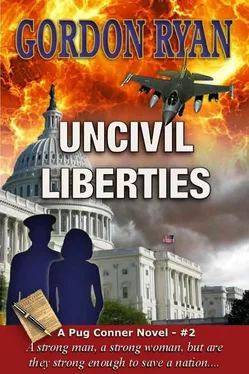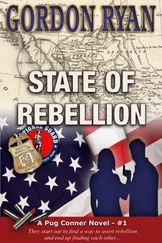Gordon Ryan - Uncivil liberties
Здесь есть возможность читать онлайн «Gordon Ryan - Uncivil liberties» весь текст электронной книги совершенно бесплатно (целиком полную версию без сокращений). В некоторых случаях можно слушать аудио, скачать через торрент в формате fb2 и присутствует краткое содержание. Жанр: Триллер, на английском языке. Описание произведения, (предисловие) а так же отзывы посетителей доступны на портале библиотеки ЛибКат.
- Название:Uncivil liberties
- Автор:
- Жанр:
- Год:неизвестен
- ISBN:нет данных
- Рейтинг книги:3 / 5. Голосов: 1
-
Избранное:Добавить в избранное
- Отзывы:
-
Ваша оценка:
- 60
- 1
- 2
- 3
- 4
- 5
Uncivil liberties: краткое содержание, описание и аннотация
Предлагаем к чтению аннотацию, описание, краткое содержание или предисловие (зависит от того, что написал сам автор книги «Uncivil liberties»). Если вы не нашли необходимую информацию о книге — напишите в комментариях, мы постараемся отыскать её.
Uncivil liberties — читать онлайн бесплатно полную книгу (весь текст) целиком
Ниже представлен текст книги, разбитый по страницам. Система сохранения места последней прочитанной страницы, позволяет с удобством читать онлайн бесплатно книгу «Uncivil liberties», без необходимости каждый раз заново искать на чём Вы остановились. Поставьте закладку, и сможете в любой момент перейти на страницу, на которой закончили чтение.
Интервал:
Закладка:
Harford nodded. “And Senator Culpepper? Is he convinced of the need for more domestic security resources-that the Domestic Tranquility bill is the answer?”
Rowley chuckled. “Culpepper used the term ‘promote the domestic tranquility’ himself the other day in committee. Ironic, isn’t it?”
“You better hope it’s only irony. We need Culpepper to support our White Paper on the need for increased domestic surveillance measures and arrest powers for the private security guard force. We need the Patriot Act expanded, more law enforcement authority. We also need to be able to offer a private security alternative to an unpopular activation of the National Guard.”
“I’ll stay on it. Culpepper is not quite as susceptible as some of the others. He’s in his last senatorial term and looking for his legacy, not more campaign funds. But he’s always been in support of security measures, and from the tone of his last public announcement, he understands that Americans are going to have to make some tough choices between personal liberty and security.”
“If he’s not going to be with us, T. J, then it’s time he retired, voluntarily or otherwise. I’ve got over fifty million tied up in the latest generation metal detectors, bomb sniffing apparatus, unmanned aerial vehicles, camera equipment, and public building security measures, not to mention getting ready for over 150,000 security guards in public facilities around the country. This operation will dwarf the TSA build-up to secure airports. I need this policy accepted and the Patriot Act enhanced to permit its implementation. Domestic Tranquility hinges on Culpepper’s committee and the Pentagon’s recommendation.”
“The Pentagon is a lock, John, and Culpepper is only one man. With or without him, we’ll see it through Congress.”
“See that you do. Are you convinced that our new president can’t stand in the way?”
“What can he do? He doesn’t even have a cabinet lined up yet, and from what we hear, he’s considered turning his nose up at Cumberland’s promised appointments. That alone will set him against his own party. He’ll be impotent to get his initiatives through Congress, much less stand in the way of all these ‘patriotic’ congressman who are only thinking of their country and the security of the people. Perception management. That’s my business, remember?”
“Save your damned perception management spiel for those more gullible, T.J. As for cabinet officers, what can we do to override Snow’s reluctance to appoint Pat Collins as Secretary of Defense? That was part of my deal with Cumberland.”
“Actually, I hear that still might go through. Nothing firm yet, but my Pentagon source says Snow has requested that the background check continue.”
“If you can massage that appointment, by all means get it done. Collins is ‘in the loop,’ if you understand my meaning. Did you arrange my interview with General Wainscott?”
“Friday. He’s champing at the bit to join SI.”
“Well, we need him to remain as Deputy Chief of Staff for the Army for the immediate future, but that doesn’t prevent him from going on salary-surreptitiously, of course. Sweeten the pot. Tell him we’ll put him on salary now and hold it until he signs with us, then we’ll call it a signing bonus.”
“Of course. I better go, John. I’ve got a few more legislators to convince that America is in need of domestic tranquility.”
“Keep me informed,” Harford said.
Chapter 6
Eisenhower Executive Office Building
Office of Information amp; Public Relations
Department of Homeland Security
Washington, D.C.
February
President Cumberland’s immediate death from a heart attack and William Snow’s elevation to the presidency, as traumatic as it seemed, had provided much grist for the mill of late night comedians. Hank Carter on Late Night Today quipped: “Did you hear that the president ordered his new business cards the other day? They came back with ‘President of the United States,’ followed by a signature line that says ‘fill in the blank.’” In two hundred twenty-five years, America had never experienced such turmoil in government.
With the creation of the Homeland Security Department over a decade ago under President Steadman, many of the traditional intelligence-gathering agencies had consolidated under the new banner. President Prescott, in her brief tenure, had been a bit more creative in forming a small group of military intelligence and special operations people reporting directly to the Secretary of Homeland Security, Anthony Weyland.
To head the new operation, a combat-experienced Marine Colonel, Padraig ‘Pug’ Connor, with whom Prescott had worked on the California secession task force, was promoted to Brigadier General and placed in charge. The new team, still in its formative stages and recruiting staff, had been in place less than ninety days when President Cumberland took office.
The cover name given to the team was the Office of Information and Public Relations. It was designed to be a part of the president’s immediate advisory and quick reaction staff, without the need to consult the Joint Chiefs. In truth, it circumvented the established approval process for application of military force and was strongly opposed by the Pentagon.
They worked out of the Eisenhower Executive Office Building, known as the EEOB, after its name was changed in 1999 from the Old Executive Office Building. The ornate structure, decried by some and praised by others, was located directly across the street from the White House.
General Connor, Sergeant Major-now Mr.-Castro, three Special Ops officers, and two enlisted NCO’s, plus a new secretary, composed the entire staff. With room for two more on the permanent staff, Connor had quietly solicited certain individuals from the special operations network to become a part of the team. The initial TO, or Table of Organization, numbered only seven people, plus two administrative support staff. But as General Connor had explained to Castro, Trojan was much more extensive.
For any mission that had been designated as security level “Troy” by the president, they had unrestricted access to military assets, including small, covert special ops units around the world, Army Delta, Recon Marines, or Navy Seals. They had authority to coordinate action with British, Australian, or New Zealand SAS troops, but only on a voluntary basis. Trojan’s tasking of military units did not require Pentagon approval, which was the primary source of military opposition. However, General Connor had decided to attempt coordination, if not cooperation, by giving notification as a matter of protocol mainly to assure that the field teams requested were not already involved in other missions.
President Prescott had given Pug free reign to develop the team, but since the change of administration, they had received no briefing on how the Office of Information and Public Relations, OIPR, would operate under the new president, either Cumberland or Snow. The turmoil of transition from Prescott to Cumberland to Snow, all within a matter of hours, had only exacerbated the situation.
Unfamiliar with such high-level political maneuvering, Pug had consulted his old boss at the CIA, Lieutenant General Bill Austin. Under Austin’s guidance, and in established military tradition, the Trojan team continued to ‘operate until relieved,’ pressing forward to establish a further foothold against intrusions, foreign or domestic. In this case, “domestic” was defined as any political or Pentagon-based assault on their domain. It was common knowledge that the Joint Chiefs of Staff, the JCS, would love-and had tried-to assume control over the group, resenting their ability to call upon military assets without standard approval procedure.
Читать дальшеИнтервал:
Закладка:
Похожие книги на «Uncivil liberties»
Представляем Вашему вниманию похожие книги на «Uncivil liberties» списком для выбора. Мы отобрали схожую по названию и смыслу литературу в надежде предоставить читателям больше вариантов отыскать новые, интересные, ещё непрочитанные произведения.
Обсуждение, отзывы о книге «Uncivil liberties» и просто собственные мнения читателей. Оставьте ваши комментарии, напишите, что Вы думаете о произведении, его смысле или главных героях. Укажите что конкретно понравилось, а что нет, и почему Вы так считаете.












